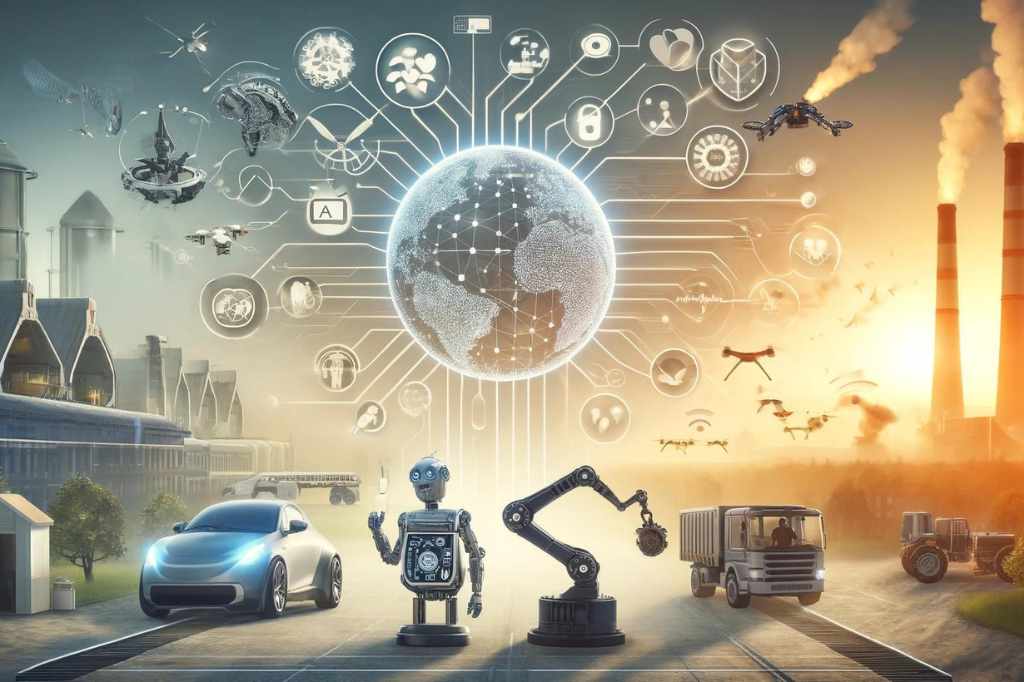
How AI is Changing the World
Our world is undergoing a significant transformation, driven by the rapid evolution of artificial intelligence (AI) since 2022.
This technology, once confined to science fiction, is now firmly entrenched in various aspects of our lives, profoundly impacting industries, augmenting human capabilities, and shaping the future trajectory.
While its potential is undeniable, understanding this revolution requires a multi-faceted understanding of its transformative power and its challenges.
Automation and Innovation
One of the topmost uses of AI can be seen in automating tasks that humans earlier did. In the manufacturing industry, AI-powered robots handle complex assembly lines with speed and accuracy and optimize production processes while enhancing quality control processes.
This is, in turn, leading to greater efficiency, lowered costs, and the ability to manage what were once complex and messy tasks with greater precision. According to information from various sources, the US automobile giant Ford uses AI-powered robots to fabricate car frames.
This enabled Ford to get better quality car chassis and quicker production, which wasn’t possible with earlier workforce or traditional ways.
Similarly, the healthcare industry uses AI to provide better-quality services to patients and stakeholders. For example, AI assists physicians, con, and consultants in various ways, such as accurate diagnostics, analysis of medical images for early detection of disease detection cases, and suggesting recommended or possible therapies and dietary plans, where needed.
Therefore, AI holds immense potential for improving patient outcomes, streamlining healthcare delivery, and facilitating preventative care. For example, DeepMind’s AlphaFold, a protein structure AI-based prediction tool, provides valuable insights into the structure of disease-causing proteins. This, in turn, makes it possible for potential drug development.
The financial sector also benefits from AI’s analytical abilities. AI-powered algorithms are streamlining financial transactions quickly, making them faster and more efficient.
For example, risk management for banks and financial organizations and providing personalized financial advice to investors or customers is now also possible through AI. Furthermore, AI is very useful in fraud detection and credit risk assessment.
AI is helpful in the stock market to enable or detect algorithmic trading, where complex algorithms execute trades based on market data and predefined strategies. At the same time, such AI resources can help stockbrokers to avoid losses and make profits. However, they can also pose threats to stock markets by manipulation.
Looking beyond automation, it’s clear that AI is also causing innovation in various industrial sectors. For example, some automobile makers are now toying with the unthinkable idea of self-driving cars and drone deliveries.
Companies like Tesla and Waymo are said to be already developing autonomous or self-driving vehicles. Though not yet available to buy, such cars could provide safer, more comfortable, and more efficient transportation through sophisticated automobiles in the future.
In the field of online retail, AI promises to reach out to customers located in remote areas that mail couriers or other delivery services can’t service. In such regions, AI-based drones are already being tested and successfully deployed by companies like Amazon. Once this becomes popular, we can also expect medical deliveries to remote areas to become faster through the use of AI-powered drones.
A Collaborative Future with Humans
One of the things that AI is doing in our world is collaborating with humans to boost productivity in various fields. This leads to a collaborative future where humans and machines work together.
One example is personal assistants such as Siri and Alexa. These are very popular now, especially among professionals. That’s because Siri and Alexa are useful for managing schedules, answering questions, and controlling smart home devices. In the future, we can expect more devices such as Siri and Alexa and better ways to make our dwellings a smart home.
Additionally, AI is helping millions of people worldwide in the complex field of decision-making. That’s because AI can analyze vast amounts of data that would be impossible for humans.
Also, AI can provide valuable insights and recommendations about various things. For example, businesses are using multiple AI modules to make informed decisions about different issues, including product development, marketing plans, staff deployment, and ad budgets, based on data available from customer behavior and market trends.
AI can quickly summarize and process this data to provide helpful feedback to organizations.
The scientific community is also deploying AI for various purposes. One of them is gene coding and other complex sciences. They’re using AI to fully comprehend complex gene structures and variations or mutations, the intelligence of animals, secrets of plants and nature, as well as gauging what lies beneath the Earth’s surface, among others.
AI is expected to soon find its way to space missions where it can perform complex tasks.
Addressing Global Challenges
AI’s impact goes beyond individual industries and extends to addressing global challenges. In the fight against climate change, AI-powered tools are being utilized to monitor environmental changes, predict extreme weather events, and develop sustainable solutions.
For instance, researchers use AI to analyze satellite imagery to track deforestation and predict wildfires, enabling proactive measures to mitigate environmental damage.
The education sector is also witnessing the potential of AI. AI-powered tutors provide personalized learning experiences that cater to individual student needs and adapt to their learning pace.
This customized approach to education holds the potential to improve learning outcomes and bridge the learning gap for students from diverse backgrounds.
Furthermore, AI is playing a role in enhancing public safety. AI algorithms analyze crime patterns, predict potential threats, and optimize emergency response strategies. For example, in the United States, some police departments are utilizing AI to analyze data from body cameras and identify potential suspicious activities, aiming to prevent crime and improve officer safety.
Challenges and the Human Touch
While AI offers many benefits, knowing the challenges accompanying its development and deployment is essential. One of the most pressing concerns is ethical considerations. Biases in the data used to train AI algorithms can lead to discriminatory outcomes.
For instance, an AI algorithm used in the criminal justice system to predict tendencies to commit criminal acts may perpetuate existing biases based on race or socioeconomic background, leading to unfair consequences.
Mitigating these biases requires careful data curation, diverse representation in development teams, and ongoing monitoring of AI systems to ensure fairness and transparency.
Another significant challenge concerns the potential job displacement caused by automation. As AI-powered robots and algorithms take over repetitive tasks, some jobs may become obsolete, particularly in the manufacturing and administrative sectors.
However, it’s essential to recognize that AI also creates new opportunities in data science, AI development, and robot maintenance.
The key lies in adapting and upskilling the workforce to meet the demands of the evolving job market. This can be achieved through educational initiatives that equip individuals with the necessary skills to thrive in the AI-driven future.
Furthermore, concerns about transparency and accountability remain pertinent. As AI algorithms become increasingly complex, understanding how they arrive at their decisions becomes crucial. This is essential for building trust and ensuring the responsible use of AI.
Developers need to prioritize designing AI systems that are interpretable and explainable, allowing humans to understand the reasoning behind their outputs.
Despite these challenges, it’s crucial to remember that AI cannot replicate the full spectrum of human intelligence. While AI excels at tasks requiring pattern recognition and data analysis, it needs more human capacity for creativity, empathy, and critical thinking.
These uniquely human strengths will remain indispensable in navigating the world’s complexities and ensuring the ethical application of AI. In the future, the most successful endeavors will likely involve collaboration between human ingenuity and the power of AI, leveraging the strengths to achieve optimal outcomes.
A Reliance on Human Expertise
AI’s very existence and effectiveness are fundamentally intertwined with human intelligence in several crucial ways. The data that fuels AI algorithms needs to be meticulously collected, labeled, and organized to ensure accurate and unbiased learning.
This critical task necessitates human expertise in various fields, from data science and engineering to domain-specific knowledge relevant to the intended application of AI.
Furthermore, training and supervising complex AI models necessitate human expertise. Defining desired outcomes, selecting appropriate algorithms, and fine-tuning parameters throughout the learning process requires human intervention.
Additionally, ongoing human monitoring and supervision are essential to prevent biases and ensure alignment with ethical considerations.
Moreover, understanding how AI arrives at its conclusions often remains a challenge. This is where human expertise comes into play. Experts are crucial for interpreting AI outputs, explaining their reasoning, and ensuring the validity of results.
Beyond development and implementation, the future of work requires human expertise in various aspects:
- Job Design and Automation Strategy: Determining which tasks are well-suited for automation and how to integrate AI into existing workflows requires human expertise in areas like job analysis, process optimization, and change management.
- Human-Machine Collaboration: As AI augments human capabilities, new roles will emerge that necessitate collaboration and effective communication between humans and machines. This requires human skills in teamwork, leadership, and the ability to translate complex technical concepts into actionable insights.
- Ethical Considerations and Oversight: As AI becomes increasingly sophisticated, ethical considerations surrounding its development, deployment, and impact on society become paramount. Humans are essential for establishing ethical frameworks, overseeing responsible AI development, and mitigating potential biases and risks.
AI isn’t a self-contained entity; it’s an evolving technology that thrives on the foundation of human intelligence at every stage of its development and application. This intricate relationship ensures that humans remain central figures in the AI-powered future, not simply bystanders to its advancement.
In Conclusion
The future promises a world where AI plays a significant role in various aspects of life, from how we work and learn to how we address global challenges. While challenges exist, it’s essential to approach AI with a sense of cautious optimism and focus on harnessing its potential for good.
By promoting collaboration between humans and machines, prioritizing ethical considerations, and continuously adapting our skills to the evolving landscape, we can ensure that AI catalyzes positive change and progress, shaping a future where both human and machine intelligence flourish.





